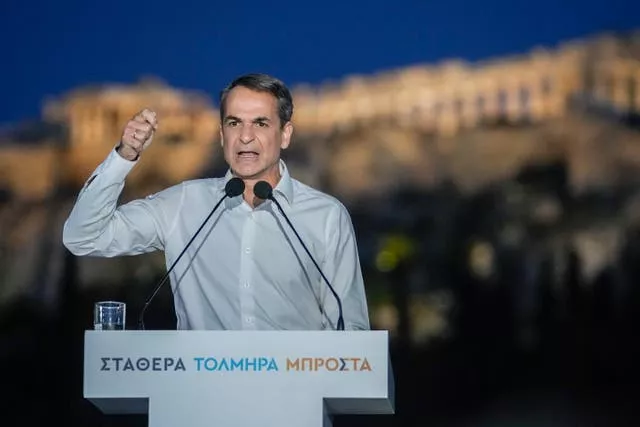Greeks are going to the polls on Sunday to elect a leader who for the first time in a decade will not be confined to steering the country’s economy from a back seat.
Conservative Prime Minister Kyriakos Mitsotakis is seeking a second term after a draconian regime of spending controls ordered by international bailout lenders ended last summer.
The clean-cut Harvard graduate, as comfortable speaking in English as his native Greek, delivered unexpectedly high growth, a steep drop in unemployment and a country on the brink of returning to investment grade on the global bond market.
Debts to the International Monetary Fund were paid off early.
A landslide re-election for the 55-year-old was once seen as a foregone conclusion.

But his centre-right New Democracy party could struggle to return to power as Greece’s voters and political parties emerge from a prolonged battle for survival.
European governments and the IMF pumped 280 billion euros (£243bn) into the Greek economy between 2010 and 2018 to prevent the eurozone member from going bankrupt. In return, they demanded punishing cost-cutting measures and reforms.
A severe recession and years of emergency borrowing left Greece with a whopping national debt that reached 400 billion euros (£347bn) last December and hammered household incomes that will likely need another decade to recover.
Left exhausted after the bailout-era political and economic turmoil, ordinary Greeks sank into private debt, low wages and job insecurity.
Mr Mitsotakis lost a long-standing double-digit lead in opinion polls following a February 28 rail disaster that killed 57 people, many of them university students ‒ battering the government narrative of acting as business-oriented modernisers.
A passenger train slammed into an oncoming freight carrier mistakenly placed on the same track in northern Greece. it has emerged that train stations were poorly staffed and safety infrastructure broken and outdated.
The European Parliament is also investigating a murky surveillance scandal after prominent Greek politicians and journalists discovered spyware on their phones. The revelations deepened mistrust among the country’s political parties at a time when consensus may be badly needed.
Six political parties are set to gain national representation, ranging from Nato-sceptic nationalists to a Communist Party vocal in its admiration of the Soviet Union 32 years after its collapse.

The far-right Greeks Party, founded by a jailed former lawmaker with a history of neo-Nazi activity, was banned from participating by the Supreme Court.
Leading the opposition is 48-year-old Alexis Tsipras, a former prime minister and the firebrand leader of the left-wing Syriza party. His campaign has focused heavily on the rail disaster and wire-tapping scandal.
Opinion polls indicate that Sunday’s election will not produce an outright winner under a newly introduced system of proportional representation. A second election in early July may be needed, when the system would revert to one that favours the winning party with a seat-bonus in parliament.
Even then, current polling data suggests Mr Mitsotakis may be forced into a coalition, with the once-powerful socialist Pasok party — that almost disappeared during the crisis — potentially holding the balance of power.
More than 9.8 million Greeks are eligible to vote in Sunday’s general election for 300 lawmakers in the parliament who serve a four-year term.
The voting age will be lowered to 17 for the first time, while in another first, Greek citizens living abroad will also be allowed to vote in their country of residence.
Polls at 22,000 voting precincts will open at 7am local time and remain open for 12 hours. The Interior Ministry estimates that 80% of the vote will be counted by 10pm.







